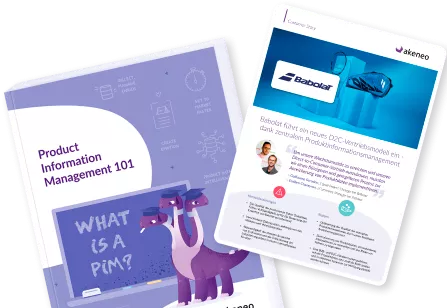Product information is the lifeblood of B2B organizations. But managing it effectively? That's where things get complicated.
According to our latest B2B Survey Results Report, an overwhelming 99% of business leaders revealed that their organization faced at least one major product information challenge in the past year.
These challenges are not just about data entry errors or slow processes—they represent much deeper, more critical issues that, if unresolved, could slow time to market, weaken customer trust, and hold back revenue growth.
From adopting AI to streamline data management to struggling with team collaboration or managing supplier data, let’s break down the five most common product information challenges facing B2B companies today and explore how they can affect the entire business—from operations to customer satisfaction. If you're in the trenches of product information management, these stats will resonate. More importantly, they’ll offer insights into how your organization can address them head-on.
Five Most Common Product Data Challenges Facing B2B
1. Applying automation/AI applications to make data usage more efficient
With the increasing availability of automation and AI tools, many organizations are eager to leverage these technologies to improve product information management. However, 37% of B2b business leaders report that integrating automation or AI into their product data processes is one of the most significant technological challenges they face.
While AI promises the potential to revolutionize product data management, many B2B organizations are still reliant on manual processes to ensure data consistency and accuracy across all channels. In fact, 40% of these businesses continue to use manual methods, which can be both time-consuming and error-prone, and leads to outdated product descriptions, inconsistent pricing, or missing specifications.
Additionally, the more complex a product portfolio becomes, the more difficult it is to manage data manually. B2B organizations often deal with large volumes of product data across diverse categories, making manual processes highly inefficient. Even small errors in product specifications or availability can lead to negative consequences, such as increased return rates, customer dissatisfaction, and the erosion of brand trust.
The perceived benefit of AI is clear: 39% of businesses believe that AI will speed up time to market through automation, which in turn enables faster product rollouts, increased market agility, and the ability to respond quickly to customer needs. Organizations that fail to integrate AI into their processes not only miss out on this benefit but also face operational slowdowns, leading to delayed product launches and reduced competitiveness.
2. Team efficiency and ability to collaborate on product data management
Another common challenge facing B2B organizations is team efficiency in managing product data.
Many companies recognize that the old ways of working—often characterized by siloed departments and manual processes—are no longer enough to stay competitive in the modern marketplace.
However, change can be difficult, and many organizations lack the resources required to evolve. In fact, 41% of B2B business leaders say they lack the right staff and skills to manage product data effectively, while 34% report budget constraints that prevent them from making necessary tech investments.
The lack of collaboration across teams can lead to a disjointed product information management process. When teams are unable to work efficiently together, product data errors can occur more frequently, leading to inconsistent information across channels. This inconsistency can confuse customers, erode trust, and lead to increased return rates.
For companies that sell complex or highly technical products, accurate and comprehensive product data is especially critical for ensuring customer satisfaction and minimizing the risk of post-purchase issues.
To combat these inefficiencies, organizations need to invest in both talent and technology that enables seamless collaboration. In the long run, failing to invest now in the right software and strategies can result in higher operating costs, longer time to market, and lost revenue opportunities due to inaccurate or incomplete product information being shared with customers.
2024 B2B Survey Results Report
3. Making product information more easily understood and accessible to buyers
As B2B buyers increasingly seek self-service options, the demand for easily accessible product information has grown. In fact, 52% of B2B companies are focusing on making more product information available online to meet this demand.
Digital self-service portals, social media, and product marketing websites have become essential channels for sharing product details, with 51%, 46%, and 45% of companies, respectively, using these tools to engage customers. However, the challenge with these channels lies in making this information both accessible and easily understood by potential buyers. Customers expect detailed product specifications, pricing information, and usage guidelines to be readily available across all digital touchpoints. The ability to access this information quickly can make or break a sale, particularly for companies selling to decision-makers who often juggle multiple priorities, need immediate access to critical details, and prefer these self-service resources.
Failing to deliver easily understandable product data can lead to frustration among buyers, resulting in abandoned carts or lost sales. Plus, poorly communicated product information can create unnecessary support inquiries, which drain customer service resources and further impact the company's efficiency.
By prioritizing the creation of clear, comprehensive, and accessible product information, businesses can not only enhance the buying experience but also reduce pressure on their support teams and improve overall customer satisfaction.
4. Managing how product information is activated on sales channels & marketplaces
As B2B organizations expand their presence across multiple sales channels, including online marketplaces, managing consistent product information becomes increasingly complex. Half of the B2B organizations surveyed see significant benefits from selling on B2B marketplaces, such as:
- Access to more customers (52%)
- Increased visibility (50%), and
- Faster sales cycles (43%)
However, 40% of companies report that ensuring product data is consistent across channels remains one of their biggest challenges.
Inconsistent product information across channels can lead to confusion among buyers, who may encounter conflicting descriptions, prices, or availability data. This inconsistency not only frustrates customers but also damages the brand's reputation and can lead to increased return rates and customer churn.
Additionally, some companies choose not to sell on B2B marketplaces because they want to retain control over their customer data and optimize their own channels. However, forgoing marketplaces can limit their reach, making it essential for companies to strike the right balance between marketplace participation and channel management. Implementing effective product information management systems is key to ensuring data consistency and maximizing the potential of each sales channel.
5. Collecting and managing data from suppliers
One of the most common challenges cited by B2B organizations is the time and effort required to collect and manage product data from suppliers. The process is often slow, with 70% of companies taking two weeks to gather and collate product information, and 10% taking more than 30 days. Plus, B2B companies stated that it takes an average of 16 days to enrich product data; that’s nearly one month’s time between receiving a new product to launching the product.
This delay in collecting, managing, and optimizing supplier data can have significant consequences for the business. When product data is not readily available or accurate, companies may struggle to launch new products, update listings on sales channels, or provide customers with the most up-to-date information. As a result, sales opportunities may be missed, and customer trust can erode due to inconsistent or outdated product information.
Improving supplier collaboration and streamlining the data collection process is critical for B2B organizations that want to accelerate their time to market and enhance their competitiveness.
Turning Product Data Challenges into Opportunities
Product information might not always make the headlines, but it's the backbone of every B2B transaction. The findings from our latest B2B Survey Results Report are a wake-up call: 99% of B2B businesses face significant product data challenges, and the impact reaches every corner of the company. Whether it's delayed time-to-market, inefficient team collaboration, or inconsistent data across channels, these problems are far from isolated—they are woven into the fabric of daily operations.
Yet, there’s a silver lining. While the challenges are real, 91% of business leaders agree that their Product Information Management (PIM) system is invaluable. Those who embrace solutions—whether through AI automation, better team collaboration, or more efficient data collection—are the ones best positioned to gain a competitive edge.
The takeaway? If your product information strategy isn’t keeping up, neither is your business. It’s time to move from manual struggles to streamlined success, and with the right tools in place, the future of your product data management can look a whole lot brighter.
Discover the Future of B2B
Download the comprehensive report based on the findings of our survey of B2B professionals to receive insights and actionable tips on navigating the tricky waters of the B2B industry.
Casey Paxton, Content Marketing Manager
Akeneo






